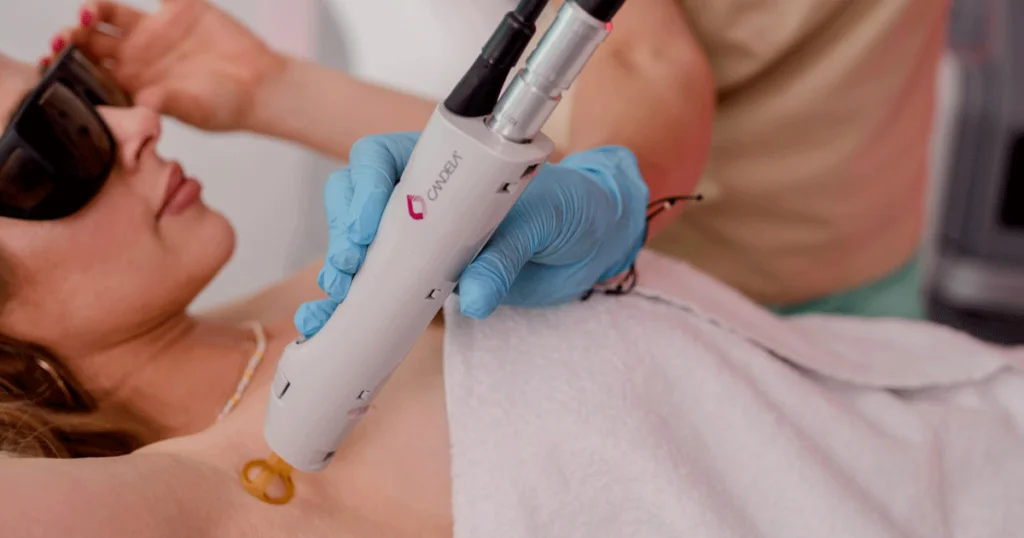Laser hair removal is one of the most effective methods for removing unwanted hair in both women and men. Many people choose this procedure because of the lasting result it provides. The factors that influence the time it takes for hairs to fall out are many. In this article, we will look at how skin and hair color, as well as hair density, affect this. We’ll give you information on what time is needed between laser hair removal treatments and how skin conditions can affect the results. You’ll know when the hairs start to fall out afterpermanently, as well asoffer tips on how to maximize the effectiveness of laser treatments.
Laser hair removal is an effective method of removing unwanted body hair. It is based on the use of laser energy, which destroys the hair follicles. Many times we get the following question from our clients, “When does the hair fall out?” This is an important question because many people expect quick and visible results from the procedure.
Is the result visible after the first laser hair removal procedure?
The time it takes for hair to fall out after laser hair removal can vary depending on individual skin and hair characteristics. It is also important to note which area of the body will undergo laser hair removal. For example, hairs in the intimate area have a longer growth cycle than leg hairs, so the time for hairs to fall out may be longer in these areas.
When do the hairs fall out on the legs and in the intimate area after laser hair removal?
Leg hairs and hairs in the intimate area have a longer growth cycle compared to other parts of the body. This means that hair on the legs and in the intimate area may require more time to be removed with laser hair removal. Due to the long growth cycle, laser hair removal on these areas may require more treatments to achieve a permanent result. On the other hand, hairs in less “hard to reach” places, such as the face or arms, have a shorter growth cycle. There they are more easily removed by laser hair removal.
It is important to note that the length of the hair growth cycle can vary from person to person, regardless of body location. For this the answer to the question, “When does the hair fall out?” for everyone can be different. This is due to individual differences in the genetic information that determines the hair structure. So although leg and intimate area hair can have a longer growth cycle, this is not a rule that applies to all people and there may be exceptions.
As a conclusion, we can not help but mention that you can see the effect of laser hair removal after the first procedure.

Factors that affect the hair fall time after laser hair removal
- Skin and hair color – Laser hair removal is most effective on dark hair and fair skin. Darker pigments in the hair absorb more laser energy. If the hairs are lighter or greyer, laser hair removal may be less effective, which would result in the need for more treatments.
-
Type of laser technology – There are different types of laser technology, such as Alexandrite, Nd:YAG, diode laser and others. Depending on the type of technology, the hair fall time may vary. Depending on the skin type and hair type, the appropriate technology is selected.
-
Hair density – Hairs that are thicker require more time to fall. With them, it takes longer to destroy all the follicles.
-
Time between laser hair removal treatments – The time it takes for hairs to fall out can be prolonged if you wait too long between laser hair removal treatments. It is usually recommended to follow a schedule that is determined by the specialist.
-
Skin condition – If the skin is inflamed or irritated, it may prolong the time for the hairs to fall out.
-
Genetics – Some people may have a slower hair growth cycle, which can lengthen the time it takes for hairs to fall out.
How skin color affects laser hair removal results
The basis of laser hair removal is the principle of absorption of light energy by melanin – the pigment that gives color to hair and skin. When laser light is directed at the hairs, melanin absorbs the light energy, which is converted into heat. The heat destroys the hair follicles that produce the hair fibers.
When do hairs fall out after laser hair removal for dark hairs?
With laser hair removal, the dark pigment of the hair (melanin) absorbs more light energy than the light hair. Because of this, dark hairs are usually easier to remove and take less time to fall out after being treated with a laser. Therefore, laser hair removal is more effective for hairs with dark pigment.
Skin color can also affect the effectiveness of laser hair removal. When hair falls out after laser hair removal can also be determined by a person’s pigmentation. With dark skin, the melanin in the skin absorbs light energy and can lead to a greater risk of stretching or burning the skin. Therefore, for dark skin, lasers are used that have a greater depth of penetration into the skin and can treat the hair without damaging the skin.
Generally speaking, laser hair removal is more effective for hairs with dark pigment and light skin. For hairs with lighter pigment, less light energy is absorbed, which can result in less effective treatment and longer hair fall time. It is for this reason that in such cases it is better to choose an Alexandrite laser, which has better melanin absorption and manages to cope with lighter and thinner hairs.
Does hair density matter for results after laser hair removal?
Hair density is another factor that can affect the effectiveness of laser hair removal. Laser hair removal works on the principle of destroying hair follicles that are in the growth phase. Therefore, if the hairs are thicker, more follicles will be in the growing phase, which can lead to better results.
When do hairs fall out with bigger hair? When the hairs are thicker, more treatments may need to be done to achieve complete removal. Therefore, when planning a laser hair removal procedure, it is important to have a professional assessment of the hair density in the area to be treated. This will allow the specialist to determine the number of treatments needed.
When hairs are thinner, better results can be achieved because each hair fiber is more likely to be treated by the laser. However, with thinner hairs, more treatments may be required to achieve the desired results.
Bottom line,
hair density can affect the effectiveness of laser hair removal
, but this is not the only factor that plays a role.

How does the time between laser hair removal treatments affect effectiveness?
The time between laser hair removal treatments is also an important factor that can affect effectiveness. The time between treatments is determined depending on the area being treated. For example, for the face it is between 3 and 5 weeks, forintimates and underarms between 6 and 8 weeks, and forlegs between8 and 12 weeks. During this period, the hair in the area that has been treated will grow and gradually fall out. After the procedure, the time of falling out of the hairs that were in the growth phase is about 2 weeks.
Oddly enough, if the time between treatments is too short, more visits may be necessary to achieve the desired result. This is due to the fact that the laser can only destroy hairs that are in the growing phase, and these are not numerous enough to be effectively treated. In other words, the hairs that were not in the growing phase will remain and will need to be treated in the next procedure.
On the other hand, if the time between sessions is too long, the hairs may enter a period of inactivity and not grow for a long period of time. This can delay the effect of laser hair removal and prolong the time to achieve the desired results.
Ultimately, it is important to choose the right timing between sessions in order to achieve optimal laser hair removal results. At Impulse Laser Studio, we will offer you the best schedule of treatments depending on the type of hair and the skin’s reaction, in order to reach a faster phair removal after laser hair removal.
How does skin condition affect laser hair removal results?
Skin condition is another important factor that can affect the results of laser hair removal and when the hairs fall out. The skin must be healthy, without wounds, infections, acne or other dermatological problems. It is good to be hydrated before the procedure to ensure better conduction of the laser energy.
Proper skin hygiene after laser hair removal is also very important to achieve the desired results. The skin should be cleaned and hot showers or baths avoided to avoid irritation. You may also find yourself more sensitive to the sun after laser hair removal. Therefore, it is advisable to avoid direct sunlight or use sunscreen to protect against harmful rays.
After all, the condition of the skin is essential for successful laser hair removal. If the skin is healthy and properly hydrated, it will be less sensitive during the procedure and better hair removal results will be achieved.
How Genetics Affects Laser Hair Removal Results
Genetics can play a role in the effectiveness of laser hair removal. Hairs vary in size, shape and pigmentation, which can hinder laser hair removal. For example, hairs on dark skin may be larger and denser, which would make epilation more difficult.
Genetics can also determine the speed of hair growth. If a person’s hair grows faster than normal, the result will come faster – once we have a more active growth phase, we also have a visible result immediately after the first treatment and it is possible that the number of treatments is smaller. However, the process is very individual, because it mainly depends on the state of hormones.
Skin can also be genetically predisposed to different characteristics that affect the results of laser hair removal.
Bottom line: when do hairs fall out after laser hair removal?
Skin condition is essential for successful laser hair removal. If the skin is healthy and properly hydrated, it will be less sensitive during the procedure and better hair removal results will be achieved, so it is important to maintain a healthy lifestyle.
In conclusion, hair fall time after laser hair removal can vary depending on a multitude of factors. It is important to have a realistic expectation of the procedure and to follow the recommendations of the specialists to achieve the desired results. Laser hair removal is an effective method of removing unwanted body hair, but it is important to keep in mind that the results are not immediate and it may take several treatments before a desirable and long-lasting result is achieved.




